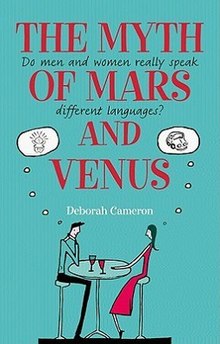Gender studies is an interdisciplinary academic field devoted to analysing gender identity and gendered representation. Gender studies originated in the field of women's studies, concerning women, feminism, gender, and politics. The field now overlaps with queer studies and men's studies. Its rise to prominence, especially in Western universities after 1990, coincided with the rise of deconstruction.
Gender-neutral language is language that avoids assumptions about the social gender or biological sex of people referred to in speech or writing. In contrast to most other Indo-European languages, English does not retain grammatical gender and most of its nouns, adjectives and pronouns are therefore not gender-specific. In most other Indo-European languages, nouns are grammatically masculine or grammatically feminine, or sometimes grammatically neuter, regardless of the actual gender of the referent.

Prejudice can be an affective feeling towards a person based on their perceived social group membership. The word is often used to refer to a preconceived evaluation or classification of another person based on that person's perceived personal characteristics, such as political affiliation, sex, gender, gender identity, beliefs, values, social class, friendship, age, disability, religion, sexuality, race, ethnicity, language, nationality, culture, complexion, beauty, height, body weight, occupation, wealth, education, criminality, sport-team affiliation, music tastes or other perceived characteristics.

Femininity is a set of attributes, behaviors, and roles generally associated with women and girls. Femininity can be understood as socially constructed, and there is also some evidence that some behaviors considered feminine are influenced by both cultural factors and biological factors. To what extent femininity is biologically or socially influenced is subject to debate. It is conceptually distinct from both the female biological sex and from womanhood, as all humans can exhibit feminine and masculine traits, regardless of sex and gender.

Carol Gilligan is an American feminist, ethicist, and psychologist, best known for her work on ethical community and ethical relationships.

Deborah Frances Tannen is an American author and professor of linguistics at Georgetown University in Washington, D.C. Best known as the author of You Just Don't Understand, she has been a McGraw Distinguished Lecturer at Princeton University and was a fellow at the Center for Advanced Study in the Behavioral Sciences following a term in residence at the Institute for Advanced Study in Princeton, New Jersey.

Men Are from Mars, Women Are from Venus (1992) is a book written by American author and relationship counselor John Gray. The book states that most common relationship problems between men and women are a result of fundamental psychological differences between the sexes, which the author exemplifies by means of its eponymous metaphor: that men and women are from distinct planets—men from Mars and women from Venus—and that each sex is acclimated to its own planet's society and customs, but not to those of the other. One example is men's complaint that if they offer solutions to problems that women bring up in conversation, the women are not necessarily interested in solving those problems, but talking about them. The book asserts each sex can be understood in terms of distinct ways they respond to stress and stressful situations.
Gay male speech has been the focus of numerous modern stereotypes, as well as sociolinguistic studies, particularly within North American English. Scientific research has uncovered phonetically significant features produced by many gay men and demonstrated that listeners accurately guess speakers' sexual orientation at rates greater than chance. Historically, gay male speech characteristics have been highly stigmatized, so that such features were often reduced in certain settings, such as the workplace.

John Gray is an American relationship counselor, lecturer, and author. In 1969, he began a nine-year association with Maharishi Mahesh Yogi before beginning his career as an author and personal relationship counselor. In 1992 he published the book Men Are from Mars, Women Are from Venus, which became a long-term best seller and formed the central theme of his subsequent books and career activities. His books have sold millions of copies.
Robin Tolmach Lakoff is a professor emerita of linguistics at the University of California, Berkeley. Her 1975 book Language and Woman's Place is often credited for making language and gender a major debate in linguistics and other disciplines.

That's Not What I Meant! How Conversational Style Makes or Breaks Relationships is Deborah Tannen's first book presenting, for a general audience, her linguistic approach to explaining how ways of speaking affect relationships. Predating by four years her phenomenally bestselling book about gender differences in ways of speaking, You Just Don't Understand, this book approaches communication and miscommunication from a linguistic point of view rather than a psychological one, emphasizing differences between the genders. The book lays out the linguistic devices and rituals that constitute "conversational style", such as indirectness, pacing, pausing, humor, overlap, and interruption, and shows their effects when styles differ.
Muted Group Theory (MGT) is a communication theory developed by cultural anthropologist Edwin Ardener and feminist scholar Shirley Ardener in 1975, that exposes the sociolinguistic power imbalances that can suppress social groups' voices.
The difference model is a theory of gendered differences in language which sees men and women as inhabiting different 'sub-cultures', resulting in different genderlects. A major proponent of the model, Deborah Tannen, summarised these differences as contrasting conversational goals: men, she argues, tend towards a "report style," focused on communicating factual information, whereas women tend towards a "rapport style," focused on building and maintaining relationships. The difference model is often contrasted with dominance/deficit and dynamic models.
Variation is a characteristic of language: there is more than one way of saying the same thing in a given language. Variation can exist in domains such as pronunciation, lexicon, grammar, and other features. Different communities or individuals speaking the same language may differ from each other in their choices of which of the available linguistic features to use, and how often, and the same speaker may make different choices on different occasions.
Research into the many possible relationships, intersections and tensions between language and gender is diverse. It crosses disciplinary boundaries, and, as a bare minimum, could be said to encompass work notionally housed within applied linguistics, linguistic anthropology, conversation analysis, cultural studies, feminist media studies, feminist psychology, gender studies, interactional sociolinguistics, linguistics, mediated stylistics, sociolinguistics, and feminist language reform and media studies.
Deborah Cameron is a British linguist and feminist who currently holds the Rupert Murdoch Professorship in Language and Communication at Worcester College, Oxford University.
LGBTQ linguistics is the study of language as used by members of LGBTQ communities. Related or synonymous terms include lavender linguistics, advanced by William Leap in the 1990s, which "encompass[es] a wide range of everyday language practices" in LGBTQ communities, and queer linguistics, which refers to the linguistic analysis concerning the effect of heteronormativity on expressing sexual identity through language. The former term derives from the longtime association of the color lavender with LGBTQ communities. "Language", in this context, may refer to any aspect of spoken or written linguistic practices, including speech patterns and pronunciation, use of certain vocabulary, and, in a few cases, an elaborate alternative lexicon such as Polari.
Feminism is one theory of the political, economic, and social equality of the sexes, even though many feminist movements and ideologies differ on exactly which claims and strategies are vital and justifiable to achieve equality.
The gender paradox is a sociolinguistic phenomenon first observed by William Labov, who noted, "Women conform more closely than men to sociolinguistic norms that are overtly prescribed, but conform less than men when they are not." Specifically, the "paradox" arises from sociolinguistic data showing that women are more likely to use prestige forms and avoid stigmatized variants than men for a majority of linguistic variables, but that they are also more likely to lead language change by using innovative forms of variables.

The Creation of Patriarchy is a non-fiction book written by Gerda Lerner in 1986 as an explanation for the origins of misogyny in ancient Mesopotamia and the following Western societies. She traces the "images, metaphors, [and] myths" that lead to patriarchal concepts' existence in Western society. She believes that the creation of patriarchy in the ancient Near East was a 2500-year period from nearly 3100 BC to 600 BC rather than a single event.








